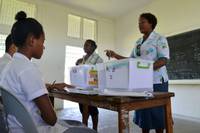Theme 11: Impact and implications of COVID-19 on the teaching profession
Thematic lead: Steve Nwokeocha
Peer Reviewer: Laurette Bristol, CARICOM, Peter Wallet, International Teachers Task Force, UNESCO and Odile Decomarmond
Lead Organisation: Africa Federation of Teaching Regulatory Authorities
Background
Before Covid-19, the Teaching profession was already considered fragile and had numerous challenges. UNESCO’s book titled Rethinking Education: Towards a Global Common Goal? (2015) describes some of these challenges as a process of deprofessionalization, marked by the “influx of unqualified teachers,” casualization of teachers, reduction in professional autonomy, erosion of quality of the teaching profession, poor remuneration of teachers and the encroachment, within educational institutions, of private management techniques” (UNESCO, 2015:54). According to the UNESCO Institute for Statistics, (2016), in Sub-Saharan Africa, “70% of countries face acute shortages of teachers, rising to 90% at secondary level”; and Sub-Saharan Africa requires 17 million teachers (6.3 million and 10.8 million teachers for the primary and secondary schools, respectively) to meet the SDG4 targets of inclusive and equitable quality education.
Objectives
- Map activities, programmes and projects of teachers in the Commonwealth countries that contributed towards the teaching of the pupils and students during the Covid-19 pandemic and resumption of schools;
- Investigate the factors that limited their ability to teach during the pandemic and resumption of schools.
- Devise strategies (short-, medium-, and long-term) to ensure that teachers are able to continue teaching effectively during emergencies and pandemics.
- Consider the roles that teachers can play as professional leaders (teacher leadership) at the micro (class), meso (school), and macro (community/society) levels in pandemics and emergencies to ensure continuity of inclusive and quality teaching and learning.
*Picture courtesy of The Commonwealth Secretariat

